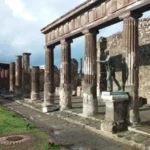So you’re planning a trip to Israel and don’t know where to start? Here is everything you need to know to prepare for your first trip to the Holy Land.
The Basics for First-Time Visitors to Israel

Money
The official currency in Israel is the Israeli Shekel (ILS). While credit cards (and digital payments) are widely accepted, it’s advisable to carry some cash, especially for smaller purchases and in more remote areas.
Check Travel Warnings
Israel is prone to sudden changes in the security situation, so it is best to check for any travel warnings issued by your government. Stay informed about the current situation in the region to ensure a safe and worry-free visit.
Language
While Hebrew and Arabic are the official languages, English is commonly spoken. Learning a few basic Hebrew phrases can enhance your experience and help you connect with locals.
- Shalom -hello goodbye, peace.
- Toda – thank you.
- Bevakasha – please, or you’re welcome.
- Kama za olay – how much does that cost.
- Ken – yes.
- Lo – no.
- Ani lo mavina ivrit – I don’t understand Hebrew.
Time Zone
Israel operates on Israel Standard Time (IST), which is GMT+2. Make sure to adjust your watches and devices accordingly to avoid any scheduling mishaps.
The Six-Day Week
The Jewish Sabbath, observed from Friday sundown to Saturday sundown, might impact your travel plans, as many businesses and services may close during this time. Public transport services are reduced on Shabbat and in some areas non-existent. Also be aware of any national holidays, some of which are observed like a Shabbat.
Religion
Israel is predominantly a Jewish country, but it embraces diversity with significant Muslim and Christian populations.
Weather
Israel experiences a Mediterranean climate with hot, dry summers and mild, wet winters. The warm weather lasts from approximately April to September. Be prepared for fluctuations in weather, in spring, fall, and winter. January tends to be the wettest and coldest month with temperatures sometimes falling to 14C/57F.
Driving
Road signs are in Hebrew and English, and driving is on the right side of the road. As a first-time visitor, you’d probably be better off not renting a car in Israel as parking is scarce in the larger cities, and traffic is often a problem.
How to Prepare for a Trip to Israel
Travel Insurance
Invest in comprehensive travel insurance that covers medical emergencies, trip cancellations, and unexpected events. This ensures peace of mind throughout your journey.
Itinerary
Plan an itinerary that allows you to explore a mix of historical sites, cultural experiences, and natural wonders to make the most of your trip. Depending on the length of your stay you should consider basing yourself for a few days in Tel Aviv and a few days in Jerusalem. Then if you have more time, spend a few days in Galilee, perhaps staying in Tiberias. And if you have 10 days or more, include a couple of days in Eilat.
Example Itinerary
Day 1-3 Tel-Aviv: In this time take a day trip up the coast to Caesarea, Haifa, and Acre; visit Jaffa; and explore Tel Aviv.
Day 4-6 Jerusalem: Spend two days seeing Jerusalem, and another day on a day trip to the Dead Sea, Masada, or Bethlehem.
If you have more than a week include:
Day 7-9 Tiberias: Visit Nazareth, the Golan Heights, Rosh Hanikra, and explore the area around the Sea of Galilee.
If you have more time or if your goal is a beach vacation: Fly from Tel Aviv to Eilat and enjoy the incredible Red Sea. It is also possible to take a one-day side trip from Eilat to Petra in Jordan.
Packing
Israelis dress casually almost all the time so pack for comfort. Make sure you bring good walking shoes or sandals as you’ll be doing a lot of walking. Take into account the cultural and religious sensitivities. Don’t forget essentials like sunscreen, a hat, a swimsuit, and a shawl or “cover-up” for visiting religious sites.
How to Get Around Israel
Car Rentals
If you prefer flexibility and autonomy, renting a car is a convenient option. Ensure you have a valid international driver’s license and familiarize yourself with local driving regulations.
Public Transport – Rav Kav
Israel’s public transportation system includes an extensive network of buses and a limited network of trains. Jerusalem (and soon Tel Aviv) has a light rail train which is fast, convenient, and uses the same payment system as other public transport systems. Consider getting a Rav Kav card for seamless travel on public transport. The card is a smart card used for public transportation payments, offering convenience and flexibility for both buses and trains. It can be purchased at major train and bus stations. Most Israeli buses do not accept cash payments onboard, but you can pay with your credit card or digital payment. Train tickets can be bought with cash.
Bike-Share
Tel Aviv has an excellent bike-share program which is operated through an app, and credit card. You can pick the bike (or scooter) up anywhere in the city and leave it at any of the other bike stations. Tel Aviv and other cities in Israel have dedicated bike paths.
Private Guide
If you’re apprehensive about planning your trip to Israel take one of the tours in Israel by Bein Harim. For a more personalized experience, hire a private guide who can provide in-depth insights into the history, culture, and hidden gems of Israel.
Package Tours
If you’re nervous about making all your travel arrangements, then package tours might be the right solution for you. They cover various attractions, making it easy for first-time visitors to explore Israel with the guidance of experienced professionals, and the price includes accommodation, transportation, and guide service.
Israel Day-Tours
Using a combination of independent travel and day tours can be the perfect solution. You get to keep your independence but have the help of professionals for those places that are out of the way or require a guide, such as Bethlehem.
Where to Stay
Israel has a wide range of accommodation options from hostels to luxury resorts. A popular alternative, especially in rural areas is to rent a “Zimmer” which is basically a B&B and is usually cheaper than a hotel. AirB&B is also available in Israel. Here are a few hotel suggestions:
Tel Aviv
Luxury: The Norman Tel Aviv, classic urban chic in the heart of the city.
Mid-Range: Center Chic Hotel, an impressive three-star hotel in a convenient location
Budget: Abraham Hostel Tel Aviv, is one of several highly rated Abraham Hostels in Israel. For a party hostel try Florentin House.
Jerusalem
Luxury: Mamilla Hotel, the ultimate luxury on the doorstep of the Old City.
Mid-Range: Harmony Hotel, located in Nahalat Shiva neighborhood in walking distance of several attractions.
Budget: The Post Hostel, is a stylish urban hostel suitable for families as well as other travelers.
Northern Israel
Luxury: The Setai Sea of Galilee, a serene, stylish hotel overlooking the Sea of Galilee (from Ein Gev on the eastern shore) with a pampering spa, gourmet food, and spacious rooms.
Mid-Range: Olive Boutique Hotel, nestled in the heart of Safed, some rooms have views of the mountains, and the hotel is close to Safed attractions.
Budget: Fauzi Inn, a 200-year-old mansion has been turned into a stylish hostel with family rooms, private rooms, and dormitory accommodation.
Eilat Hotels
Luxury: Herods Palace is the best of the best, on par with any other luxury hotel in the world.
Mid-Range: Leonardo Plaza, has an excellent location, great service, and all the amenities you need, also good for families.
Budget: Astral Maris, is clean, and simple, with a swimming pool, and a convenient location near the beach and entertainment.
Where and What to Eat
Food
You’ll be able to find everything you want to eat in Israel, even pork depending on where you go. The majority of restaurants serve kosher food which means that they specialize exclusively in dishes made either with dairy products or meat. Vegetarians and vegans will be in heaven with all the many options available, and those seeking healthy food will also enjoy the outstanding fresh produce in Israel. You can also sample cuisine from around the world, and you shouldn’t miss the Moroccan, Yemeni, and Georgian dishes in particular.
Israelis love street food and you’ll have plenty of options but the ones you shouldn’t miss are hummus, falafel, shawarma, and shakshuka. Enough cannot be said about Israel’s delicious pastries. Stop by one of the many bakeries to try the mouthwatering savory barakas or sweet rogalach. While in Jerusalem visit the Machane Yehuda Market where you’ll find many interesting restaurants including the award-winning Machneyuda.
What to See
From the historic sites of Jerusalem to the modern vibe of Tel Aviv, Israel offers a myriad of attractions. Visit the Western Wall, the Dead Sea, and the vibrant markets. Explore the Negev Desert, the Golan Heights, and the ancient city of Akko for a comprehensive experience.
Must-See Attractions for First-Time Visitors to Israel
- Old City, Jerusalem: Packed with history and biblical sites surrounded by 16th-century walls.
- Western Wall, Jerusalem: The most sacred Jewish site in the world.
- Church of the Holy Sepulchre: A 4th-century church in Jerusalem’s Old City encompassing the site of Christ’s burial and crucifixion.
- Bethlehem: A day trip from Jerusalem, the place of Christ’s birth and home to the Church of Nativity.
- Tel Aviv: Bauhaus architecture, world-class museums, golden beaches, quaint neighborhoods, and a dynamic nightlife.
- Old Jaffa: A charming ancient port city with cobblestone streets and art galleries.
- Sea of Galilee: Surrounded by greenery and biblical sites.
- Golan Heights: Go skiing, and see historical sites, hot springs, nature reserves, and do some wine tasting at the many wineries.
- Baha’i Gardens, Haifa: Exquisite terraced gardens with panoramic views.
- Caesarea: Ruins of a Roman city with a harbor and amphitheater.
- Masada: An ancient hilltop fortress with stunning views of the Dead Sea.
- Dead Sea: Float in the hypersaline waters and experience the therapeutic mud.
- Acre: Explore the well-preserved medieval architecture and ancient port.
- Ramon Crater, Negev Desert: A unique geological formation for hiking and stargazing.
- Eilat: At Israel’s southernmost point on the shore of the Red Sea you can swim with dolphins and snorkel among beautiful coral reefs.









